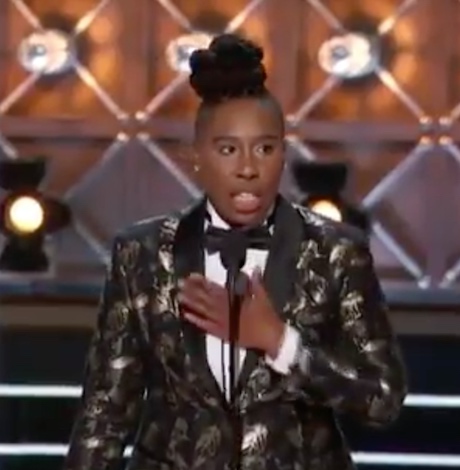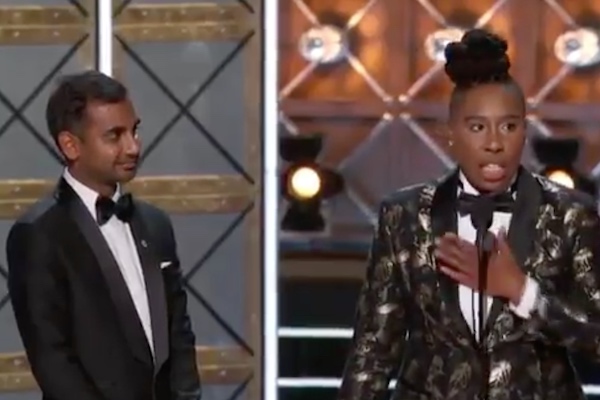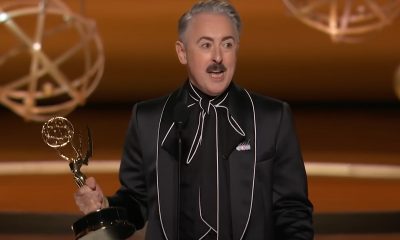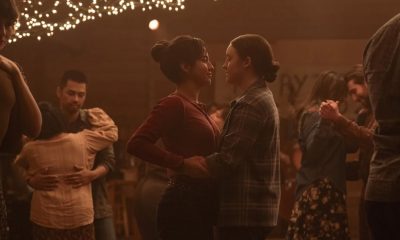Arts & Entertainment
‘The Handmaid’s Tale,’ Lena Waithe win big at politically charged Emmys
the Hulu series won a total of eight awards for the night


(Aziz Ansari and Lena Waithe accept the award for Outstanding Writing for a Comedy Series. Screenshot via Twitter.)
The 69th Primetime Emmy Awards was filled with historic wins, political humor and some LGBT representation on Sunday night.
Hosted by late night talk show host Stephen Colbert, the awards ceremony wasn’t short on digs at the Trump administration. Colbert’s opening monologue was riddled with Trump references. In one of the most surprising moments of the night, Sean Spicer made an appearance wheeling out a podium as a nod to Melissa McCarthy’s portrayal of him on “Saturday Night Live.”
“This will be the largest audience to witness the Emmys, period,” Spicer told the shocked crowd.
Dolly Parton, Jane Fonda and Lily Tomlin joined together for a “Nine to Five” reunion on stage and took their own aim at Trump.
“Back in 1980, in that movie we refused to be controlled by a sexist, egotistical, lying, hypocritical bigot,” Fonda began.
“And in 2017, we still refuse to be controlled by a sexist, egotistical, lying, hypocritical bigot,” Tomlin finished to the cheers of the crowd.
The “9 to 5” stars take aim: “In 2017, we still refuse to be controlled by a sexist, egotistical, lying, hypocritical bigot.” #Emmys pic.twitter.com/rvZVu4MfgP
— Jarett Wieselman (@JarettSays) September 18, 2017
RuPaul also made an appearance as a living Emmy statue being quizzed by Colbert on her dating life with other award statues.
.@RuPaul plays “Emmy” at the #Emmys, disses other awards shows https://t.co/wvJkc1TOJl pic.twitter.com/2zPdvcZPoG
— Hollywood Reporter (@THR) September 18, 2017
Dave Chappelle presented the award for Outstanding Director in a Comedy Series and brought attention to D.C. Public Schools with a random shoutout.
“All right, now I’m going to read this teleprompter. Shout out to D.C. Public Schools, here we go,” Chappelle, who is an alumni of Duke Ellington School of the Arts, joked.
Later in the night while accepting his award for Outstanding Writing for a Variety Series, comedian John Oliver asked to get D.C. Public Schools trending on Twitter. His plea was heard and the hashtag was trending nationally.
The awards of the night marked firsts for many who held the statue on stage.
Lena Waithe made history for winning an Emmy for Outstanding Writing for a Comedy Series for co-writing the episode “Thanksgiving” on “Master of None” with the show’s co-creator, Aziz Ansari. She is the first black woman to receive the honor.
“Thanksgiving,” tells the story of how Waithe’s character Denise comes to terms with her sexuality and coming out in a black family over a series of family Thanksgivings. Waithe thanked her girlfriend while accepting the award and gave a special shoutout to her “LGBTQIA family.”
“I see each and every one of you,” Waithe says. “The things that make us different – those are our superpowers. Every day when you walk out the door and put on your imaginary cape and go out there and conquer the world, because the world would not be as beautiful as it is if we weren’t in it. And for everybody out there that showed us so much love for this episode, thank you for embracing a little Indian boy from South Carolina and a queer black girl from the South Side of Chicago.”
Awesome message from Lena Waithe during her #Emmys acceptance speech. #Emmys2017 #EmmyAwards pic.twitter.com/Ln1sKck8Xt
— Josh Sánchez (@jnsanchez) September 18, 2017
Donald Glover became the first black person to win both Outstanding Lead Actor in a Comedy Series and for comedy directing for his work on “Atlanta.” Julia Louis-Dreyfus won for Outstanding Lead Actress in a Comedy Series for her role on “Veep,” making her the record-holder for most Emmys won for the same role in the same series.
Sterling K. Brown was the first black man to win Outstanding Lead Actor in a Drama Series for “This is Us” since Andre Braugher won in 1998. Riz Ahmed took home Outstanding Lead Actor in a Limited Series for “The Night Of,” making him the first South Asian man to receive the honor.
Kate McKinnon won Outstanding Supporting Actress in a Comedy Series and thanked Hillary Clinton, who she frequently portrayed on “Saturday Night Live.”
“San Junipero,” from the sci-fi Netflix series “Black Mirror,” also received awards for Outstanding Television Movie and Outstanding Writing in a Limited Series or Movie. “San Junipero” follows an interracial, lesbian couple who fall in love in a simulated, alternate reality. It’s often been praised for its positive portrayal of an LGBT relationship and for having a happy ending.
“The Handmaid’s Tale” swept the Emmys, winning a total of eight awards including Outstanding Drama Series and Outstanding Lead Actress in a Drama Series for Elisabeth Moss.
List of winners below.
Outstanding Lead Actor in a Drama Series
Sterling K. Brown- “This Is Us”
Anthony Hopkins, “Westworld”
Bob Odenkirk, “Better Call Saul”
Matthew Rhys, “The Americans”
Liev Schreiber, “Ray Donovan”
Kevin Spacey”House of Cards”
Milo Ventimiglia, “This Is Us”
Outstanding Lead Actress in a Drama Series
Viola Davis, “How to Get Away With Murder”
Claire Foy, “The Crown”
Elisabeth Moss, “The Handmaid’s Tale”
Keri Russell, “The Americans”
Evan Rachel Wood, “Westworld”
Robin Wright, “House of Cards”
Outstanding Supporting Actor in a Drama Series
Jonathan Banks, “Better Call Saul”
Ron Cephas Jonas, “This Is Us”
David Harbour, “Stranger Things”
Michael Kelly, “House of Cards”
John Lithgow, “The Crown”
Mandy Patinkin, “Homeland”
Jeffrey Wright , “Westworld”
Outstanding Supporting Actress in a Drama Series
Ann Dowd, “The Handmaid’s Tale”
Samira Wiley, “The Handmaid’s Tale”
Uzo Aduba, “Orange Is the New Black”
Millie Bobby Brown, “Stranger Things”
Chrissy Metz, “This Is Us”
Thandie Newton, “Westworld”
Outstanding Lead Actor in a Comedy Series
Anthony Anderson, “Black-ish”
Aziz Ansari, “Master of None”
Zach Galifianakis, “Baskets”
Donald Glover, “Atlanta”
William H. Macy, “Shameless”
Jeffrey Tambor, “Transparent”
Outstanding Lead Actress in a Comedy Series
Pamela Adlon, “Better Things”
Jane Fonda, “Grace and Frankie”
Allison Janney, “Mom”
Ellie Kemper, “Unbreakable Kimmy Schmidt”
Julia Louis-Dreyfus, “Veep”
Tracee Ellis Ross, “Black-ish”
Lily Tomlin, “Grace and Frankie”
Outstanding Supporting Actor in a Comedy Series
Louie Anderson, “Baskets”
Alec Baldwin, “Saturday Night Live”
Tituss Burgess, “Unbreakable Kimmy Schmidt”
Ty Burrell, “Modern Family”
Tony Hale, “Veep”
Matt Walsh, “Veep”
Outstanding Supporting Actress in a Comedy Series
Vanessa Bayer, “Saturday Night Live”
Leslie Jones, “Saturday Night Live”
Kate McKinnon, “Saturday Night Live”
Kathryn Hahn, “Transparent”
Judith Light, “Transparent”
Anna Chlumsky, “Veep”
Outstanding Lead Actor in a Limited Series or Movie
Riz Ahmed, “The Night Of”
Benedict Cumberbatch,” Sherlock”
Robert De Niro, “Wizard of Lies”
Ewan McGregor, Fargo
Geoffrey Rush, Genius
John Turturro, The Night Of
Outstanding Limited Series
“Big Little Lies”
“Fargo”
“Feud: Bette and Joan”
“The Night Of”
“Genius”
Best TV Movie
“Black Mirror: San Junipero”
“Dolly Parton’s Christmas of Many Colors”
“The Immortal Life of Henrietta Lacks”
“Sherlock: The Lying Detective”
“The Wizard of Lies”
Outstanding Lead Actor in a Limited Series
Riz Ahmed, “The Night Of”
Benedict Cumberbatch, “Sherlock: The Lying Detective”
Robert De Niro, “The Wizard of Lies”
Ewan McGregor, “Fargo”
Geoffrey Rush, “Genius”
John Turturro, “The Night Of”
Outstanding Lead Actress in a Limited Series
Carrie Coon, “Fargo”
Felicity Huffman, “American Crime”
Nicole Kidman, “Big Little Lies”
Jessica Lange, “Feud: Bette and Joan”
Susan Sarandon, “Feud: Bette and Joan”
Reese Witherspoon, “Big Little Lies”
Outstanding Supporting Actress in a Limited Series or Movie
Judy Davis, “Feud: Bette and Joan
Laura Dern, “Big Little Lies”
Jackie Hoffman,”Feud: Bette and Joan”
Michelle Pfeiffer, “The Wizard of Lies”
Shailene Woodley, “Big Little Lies”
Outstanding Supporting Actor in a Limited Series or Movie
Bill Camp, “The Night Of”
Alfred Molina, “Feud: Bette and Joan”
Alexander Skarsgard, “Big Little Lies”
David Thewlis, “Fargo”
Stanley Tucci, “Feud: Bette and Joan”
Michael Kenneth Williams, “The Night Of”
Outstanding Variety Talk Series
“Full Frontal With Samantha Bee”
“Jimmy Kimmel Live!”
“Last Week Tonight With John Oliver”
“The Late Late Show With James Corden”
“The Late Show With Stephen Colbert”
“Real Time With Bill Maher”
Outstanding Reality-Competition Program
“The Amazing Race”
“American Ninja Warrior”
“Project Runway”
“RuPaul’s Drag Race”
“Top Chef”
“The Voice”
Outstanding Directing for a Comedy Series
Jamie Babbit, “Silicon Valley”
Donald Glover, “Atlanta”
Mike Judge, “Silicon Valley”
David Mandel, “Veep”
Morgan Sackett, “Veep”
Dale Stern, “Veep”
Outstanding Writing for a Drama Series
The Duffer Brothers, “Stranger Things”
Lisa Joy and Jonathan Nolan, “Westworld”
Peter Morgan, “The Crown”
Bruce Miller, “The Handmaid’s Tale”
Gordon Smith, “Better Call Saul”
Joe Weisberg and Joel Fields, “The Americans”
Outstanding Writing for a Comedy Series
Aziz Ansari and Lena Waithe, “Master of None”
Alec Berg, “Silicon Valley”
Donald Glover, “Atlanta”
Stephen Glover, “Atlanta”
Billy Kimball, “Veep”
David Mandel, “Veep”
Best Writing for a Limited Series, Movie or Dramatic Special
Charlie Brooker, “Black Mirror: San Junipero”
David E. Kelley, “Big Little Lies”
Noah Hawley, “Fargo”
Ryan Murphy, “Feud: Bette and Joan”
Jaffe Cohen, Michael Zam & Ryan Murphy, “Feud: Bette and Joan”
Richard Price & Steven Zaillian, “The Night Of”
Outstanding Directing for a Drama Series
Stephen Daldry, “The Crown”
Kate Dennis, “The Handmaid’s Tale”
The Duffer Brothers, “Stranger Things”
Vince Gilligan, “Better Call Saul”
Lesli Linka Glatter, “Homeland”
Reed Morano, “The Handmaid’s Tale”
Jonathan Nolan, “Westworld”
Photos
PHOTOS: Sydney Gay and Lesbian Mardi Gras Parade
48th annual LGBTQ event held in Australian city

The 48th annual Sydney Gay and Lesbian Mardi Gras Parade was held on Feb. 28.
(Photos by Cori Mitchell)




















a&e features
35 years after ‘Truth or Dare,’ Slam is still dancing
Salim Gauwloos on Madonna, HIV, and why he almost didn’t audition for Blond Ambition Tour

Most gay men of a certain age remember “the kiss.”
It was the moment Madonna’s dancers Salim Gauwloos and Gabriel Trupin locked lips in the hit 1991 documentary film “Truth or Dare,” which is celebrating its 35th anniversary this spring.
The kiss was hot, but what made it groundbreaking is that it appeared in a mainstream Hollywood movie that screened in suburban multiplexes across the country. This wasn’t an obscure art house film. The movie, and tour on which it was based, received months of breathless media attention all over the world for bold expressions of female empowerment and queer visibility. Madonna was threatened with arrest in Toronto for simulating masturbation on stage and Pope John Paul II urged Catholics to boycott the show, triggering a media firestorm.
“Truth or Dare” was billed as a behind-the-scenes documentary of the tour, but it quickly became clear that the real star of the show wasn’t Madonna, but rather her colorful troupe of seven backup dancers, six of whom identified as gay: Kevin Stea, Carlton Wilborn, Luis Xtravaganza Camacho, Jose Gutierez Xtravaganza, Gauwloos, and Trupin; Oliver Crumes III identifies as straight.
We saw them party and march in the New York City Pride parade. They were unabashedly queer at a dangerous time — before protease inhibitors began to stem the AIDS plague and before most celebrities and politicians embraced the gay community in any real way. Being out in 1991 carried major risks to career and reputation.
Enter Gauwloos, one of those brave dancers who vogued his way into the hearts of countless gay men entranced by his handsome looks, his stage presence, and dance skills.
Gauwloos — known then and now as “Slam”— sat down with the Blade to talk Madonna, the lasting impact of “Truth or Dare,” the public disclosure of his HIV status, and plans for a new book on his life.
His story is fascinating — from growing up in Europe to dancing in New York to landing the gig of a lifetime with Madonna. He performed on that tour while secretly HIV positive and went without medical treatment for 10 years because he was living in the United States as an undocumented immigrant. Not even Madonna knew of his HIV status. Two other dancers on the tour were also HIV positive but no one talked about it. Ironically, Madonna was singing “Express Yourself” and advocating for condom use during her concerts yet backstage three of her dancers were secretly positive.
“A lot of people were dying so I wasn’t going to tell Madonna I had HIV,” said Slam, now 57. “And the others didn’t either. It wasn’t the moment to do it. She used to make speeches about Keith Haring and AIDS and I thought it’s going to be me next.”
Gabriel Trupin died of AIDS in 1995. Slam was diagnosed at age 18 in 1987, a frightening time when a positive test result often meant a death sentence. He booked the “Blond Ambition Tour” at age 21 after moving to New York. His friends encouraged him to audition but Slam resisted because he wasn’t a big Madonna fan.
“It was crazy, everyone wanted that job,” he said, “but I wanted to dance with Janet Jackson and Paula Abdul.” He listened to his friends and shortly after the audition, Slam received a call from Madonna herself inviting him to join the tour.
“We all wanted to be stars but not even Madonna knew how big that tour would become. The way it was choreographed and directed, the stars aligned. … It never looks dated even today.”

The world tour kicked off in Japan in April 1990 then moved to the United States and Europe, stirring controversy wherever it went. There was the iconic cone bra; the aforementioned simulated masturbation during “Like a Virgin”; and religious imagery that offended many Catholic groups and the Vatican.
And the controversy didn’t end with the tour. Cameras were rolling throughout the tour for what Slam thought would be a “video memory” for Madonna. But as the tour unfolded, director Alek Keshishian reportedly became more interested in what was happening behind the scenes so plans for mere tour footage were expanded into a full documentary.
“We were young and partying and didn’t really know what was going on,” Slam said. “You live in this celebrity bubble and you sign a paper – I don’t even know what I signed.”
In 1992, Kevin, Oliver, and Gabriel sued Madonna for invasion of privacy and fraud claiming she used some footage without their consent. They claim they were told nothing would be included in the film that they didn’t want to be seen. In one specific incident, Gabriel alleged that he told producers he didn’t want the scene of him kissing Slam to be in the film as he wasn’t fully out.
“Gabriel was forcibly outed,” in the movie, Kevin said in a 2016 interview.
Slam did not join his colleagues in the lawsuit.
“I couldn’t sue because I was illegal but I wasn’t ever going to sue,” Slam said. “I’m not a suing kind of person. But good for them, they fought for it and won. A lot of people don’t have the balls to sue Madonna.” The suit was settled two years later for an undisclosed sum.
“We were all conflicted about the kiss,” he said with a laugh. “The kiss, oh my God, my boyfriend is going to kill me! Belgian stress!”
Beyond worrying about his boyfriend’s reaction, Slam had concerns about the impact of being openly gay on his modeling career.
“In 1990, you couldn’t get high fashion campaigns as an openly gay model,” he said. “I was worried about that. I couldn’t get a campaign because I was gay. My agency told me to say I was straight and it was just a game.”
In 2016, pegged to the 25th anniversary of “Truth or Dare,” the surviving six dancers filmed a documentary about their lives post-Madonna titled “Strike A Pose.” In it, Slam publicly revealed his HIV status for the first time in an emotional scene with his former colleagues.
“I found the strength to tell the world I have HIV,” he recalls. “I was scared but I felt brave. The outcome and messages were beautiful. After I saw ‘Strike A Pose,’ I knew we gave people hope. And not just for gay people.”
He was infected in 1987 but didn’t get treated until 1997. After the tour ended, he said he went into a depression and his agency dropped him.
“I was partying too much after the tour,” he recalls. “I made a decision to live as an illegal alien.” In 1997, Slam collapsed and was rushed to the hospital with pneumonia.
“They started treating me and thank God the new HIV drugs were out, the cocktails, it took me a couple months to get better.”
Madonna didn’t participate in “Strike A Pose” and Slam said he hasn’t seen or spoken to her since the end of the tour. He said he had no idea of the impact “Truth or Dare” would have.
“You look at this movie in 1991 and you don’t think it’s going to be such a big thing and 35 years later it’s still helping people,” he said. “It was helpful for people who felt alone at that time. It was such an important documentary.
“I don’t think younger gay people realize how important Madonna was to gay and queer visibility — she was a big part of it. We showed the world it’s OK to be gay and that was the great message of this movie.”
He noted that, decades later, many of his friends have transgender kids and that queer culture is represented in much of mainstream pop culture.
“It’s amazing how far we’ve come,” he said. “I know we’ll always be marginalized but we have come so far. I’m really proud of our community. The current nightmare will be over and I do believe that things will get better.”
Referencing President Trump’s attacks on the LGBTQ community and crackdown on immigration, Slam described the situation in the U.S. today as “sad.”
“Everything is such a mess,” he said. “Some of these people have lived here 30-40 years and they take you out of your home. I can’t even imagine. It breaks my heart. When I was illegal it was a different story.”
Slam met his husband, Facundo Gabba, who’s from Argentina, in 2000, and he helped him get a legal case together to win citizenship. He filed a case in 2001 and was told there was a 99 percent chance he wouldn’t be permitted to stay in the United States because they weren’t allowing HIV-positive immigrants to remain in the country. But he got his green card anyway in 2005 and became a U.S. citizen in 2012.
Today, Slam and Gabba live in Brooklyn, though they travel a lot because “I can’t take the cold.” The couple married in Argentina in 2010 and in the U.S. in 2016.
Slam is still dancing and working as a choreographer. He’s teaching at a contemporary dance festival in Vienna in July and even offers online lessons via Salimdans.com.
As a longtime HIV survivor, Slam is dedicated to a healthful lifestyle.
“You have to keep moving; when you move you stay healthy,” he says. “Dance heals everything. I do yoga, I eat healthy and clean as possible. I don’t watch much TV … I try to stay healthy and positive. If I absorb all of the negativity I would be sick.”

In addition to his ongoing work in dance and choreography, Slam is in the early stages of writing a book about his extraordinary life and pioneering career.
“I always knew I had a book inside of me. I want to talk about my HIV status. I know I can inspire more people. I want to tell even more secrets in the book; secrets are a poison so I want to tell everything.”
Among those secrets, he notes, is a desire to write about his strict Muslim father and the years he spent as an undocumented immigrant in America.
“Those are the things I want to talk about, the struggles. It’s a love story, hope and resilience. I know it will help people.”
As for his friends from the tour, Slam says he remains in contact with Gabriel’s mother and José Xtravaganza is his best friend. Baltimore’s Center Stage theater is currently developing a new musical about Xtravaganza’s life. And Slam said he occasionally talks to Oliver, though “he still can’t pronounce Sandra Bernhard’s name.”
At the end of our interview, Slam indulged a round a rapid fire questions:
• Favorite song to perform in the “Blond Ambition” tour? “Express Yourself.”
• Aside from Madonna, who was your favorite artist you worked with? Toni Braxton in “Aida” on Broadway.
• Favorite Madonna song? “Live to Tell”
• Favorite Madonna video? “Bedtime Stories”
• What’s more stressful: performing in a concert or performing on the VMAs? “Both, because we always had to be perfect.”
• Did you go to Madonna’s recent “Celebration” tour? “I didn’t see the show but I saw clips online.”
• What do you remember most about performing “Vogue” at the VMAs? “It was nerve-racking for them to flip those fans.”
• When was the last time you vogued? “I teach classes so a couple weeks ago.”
Books
Love or fear flying you’ll devour ‘Why Fly’
New book chronicles a lifetime obsession with aircraft

‘Why Fly’
By Caroline Paul
c. 2026, Bloomsbury
$27.99/256 pages
Tray table folded up.
Check. Your seat is in the upright position, the airflow above your head is just the way you like it, and you’re ready to go. The flight crew is making final preparations. The lights are off and the plane is backing up. All you need now is “Why Fly” by Caroline Paul, and buckle up.

When she was very young, Paul was “obsessed” with tales of adventure, devouring accounts written by men of their derring-do. The only female adventure-seeker she knew about then was Amelia Earhart; later, she learned of other adventuresome women, including aviatrix Bessie Coleman, and Paul was transfixed.
Time passed; Paul grew up to create a life of adventure all her own.
Then, the year her marriage started to fracture, she switched her obsession from general exploits to flight.
Specifically, Paul loves experimental aircraft, some of which, like her “trike,” can be made from a kit at home. Others, like Woodstock, her beloved yellow gyrocopter, are major purchases that operate under different FAA rules. All flying has rules, she says, even if it seems like it should be as freewheeling as the birds it mimics.
She loves the pre-flight checklist, which is pure anticipation as well as a series of safety measures; if only a relationship had the same ritual. Paul loves her hangar, as a place of comfort and for flight in all senses of the word. She enjoys thinking about historic tales of flying, going back before the Wright Brothers, and including a man who went aloft on a lawn chair via helium-filled weather balloons.
The mere idea that she can fly any time is like a gift to Paul.
She knows a lot of people are terrified of flying, but it’s near totally safe: generally, there’s a one in almost 14 million chance of perishing in a commercial airline disaster – although, to Paul’s embarrassment and her dismay, it’s possible that both the smallest planes and the grandest loves might crash.
If you’re a fan of flying, you know what to do here. If you fear it, pry your fingernails off the armrests, take a deep breath, and head to the shelves. “Why Fly” might help you change your mind.
It’s not just that author Caroline Paul enjoys being airborne, and she tells you. It’s not that she’s honest in her explanations of being in love and being aloft. It’s the meditative aura you’ll get as you’re reading this book that makes it so appealing, despite the sometimes technical information that may flummox you between the Zen-ness. It’s not overwhelming; it mixes well with the history Paul includes, biographies, the science, heartbreak, and exciting tales of adventure and risk, but it’s there. Readers and romantics who love the outdoors, can’t resist a good mountain, and crave activity won’t mind it, though, not at all.
If you own a plane – or want to – you’ll want this book, too. It’s a great waiting-at-the-airport tale, or a tuck-in-your-suitcase-for-later read. Find “Why Fly” and you’ll see that it’s an upright kind of book.
The Blade may receive commissions from qualifying purchases made via this post.




















